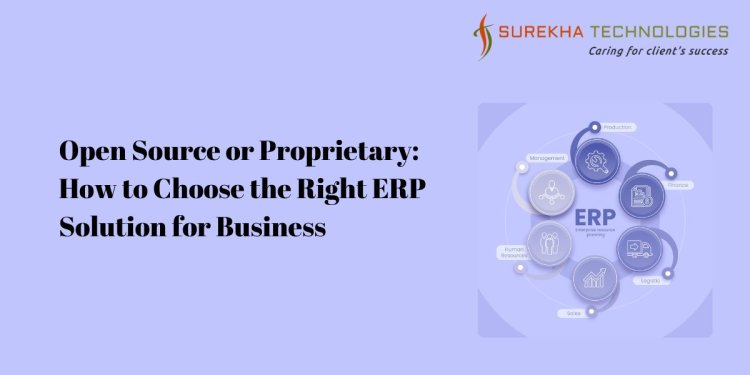Open Source or Proprietary: How to Choose the Right ERP Solution for Business

Enterprise Resource Planning (ERP) systems are the backbone of modern businesses, streamlining operations, automating workflows, and enhancing decision-making. When choosing an ERP solution, businesses often face a crucial decision: open-source or proprietary ERP? Each model has its advantages and limitations, and selecting the right one depends on factors like budget, customization needs, and long-term scalability. In this article, we’ll explore the key differences between open-source and proprietary ERP solutions, helping you make an informed choice for your business.
Understanding Open-Source ERP Solutions
Open-source ERP solutions are platforms with publicly available source codes, allowing businesses to modify and customize the system to meet their specific needs. Odoo ERP Solutions is a popular example of an open-source ERP that provides flexibility and scalability across industries.
Benefits of Open-Source ERP
-
Cost-Effective – Open-source ERPs typically have no licensing fees, making them a budget-friendly option, especially for startups and small businesses.
-
Customization – Businesses can modify the code to tailor the system to their workflows, ensuring a perfect fit for unique business processes.
-
Community Support – Open-source solutions like Odoo benefit from a strong global community that contributes to continuous improvements, bug fixes, and feature updates.
-
Scalability – Open-source ERP systems can grow with your business, allowing you to add modules and functionalities as needed.
-
Integration Capabilities – Open-source ERP solutions are often easier to integrate with third-party applications, enabling seamless business operations.
Challenges of Open-Source ERP
-
Requires Technical Expertise – Customization and maintenance may require in-house IT expertise or external developers.
-
Security Risks – Since the source code is publicly available, businesses need strong security measures to prevent vulnerabilities.
-
Ongoing Maintenance Costs – While licensing fees are eliminated, customization and system updates may require investment in skilled developers.
Understanding Proprietary ERP Solutions
Proprietary ERPs are commercial software solutions developed and maintained by a single company. These systems come with vendor support, licensing fees, and predefined functionalities. Examples include SAP, Microsoft Dynamics, and Oracle ERP.
Benefits of Proprietary ERP
-
Vendor Support – Businesses receive dedicated customer support, regular updates, and security patches.
-
Reliability & Security – Proprietary ERPs have strict security protocols, ensuring better protection against cyber threats.
-
Ease of Implementation – Since these ERPs come as ready-to-use solutions, businesses can implement them without extensive development efforts.
-
Compliance & Standardization – Many proprietary ERPs are designed to meet industry regulations, ensuring businesses stay compliant.
Challenges of Proprietary ERP
-
High Costs – Licensing, implementation, and support fees can make proprietary ERPs expensive, particularly for small and medium-sized businesses.
-
Limited Customization – Businesses must rely on the vendor for modifications, which may limit flexibility.
-
Vendor Lock-in – Switching providers or integrating third-party applications can be challenging due to proprietary restrictions.
How to Choose the Right ERP Solution?
Selecting the right ERP depends on several factors:
1. Business Size and Budget
-
If you have a limited budget, an open-source ERP like Odoo ERP Solutions is a cost-effective choice.
-
For large enterprises with complex requirements and high security needs, proprietary ERP might be preferable.
2. Customization and Flexibility
-
Businesses with unique workflows may benefit from open-source ERP, as it allows custom modifications.
-
If your company prefers out-of-the-box functionalities with minimal customization, proprietary ERP is a better option.
3. IT Resources and Expertise
-
Companies with an in-house development team can leverage the flexibility of open-source ERP.
-
Organizations without dedicated IT resources may find proprietary ERPs easier to manage with vendor support.
4. Long-Term Scalability
-
If your business requires a scalable ERP that evolves with growth, Odoo ERP Solutions offers a modular structure for expansion.
-
Proprietary ERP may offer predefined scalability options but at a higher cost.
Conclusion
Both open-source and proprietary ERP solutions have their strengths and limitations. Odoo ERP Solutions provides a highly flexible and cost-effective alternative to expensive proprietary ERPs, making it an ideal choice for businesses seeking customization and scalability. However, if security, compliance, and vendor support are your top priorities, a proprietary ERP may be the right investment. Assess your business needs carefully to choose the ERP that aligns best with your long-term goals.
What's Your Reaction?














.jpg)
.jpg)


